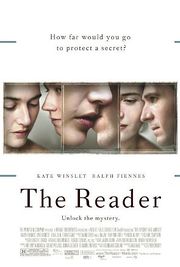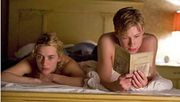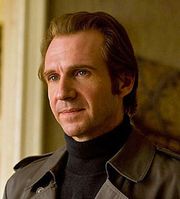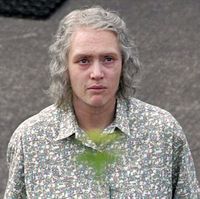The Reader (2008 film)
| The Reader | |
|---|---|
 Theatrical poster |
|
| Directed by | Stephen Daldry |
| Produced by | |
| Written by | David Hare |
| Starring |
|
| Music by | Nico Muhly |
| Cinematography |
|
| Editing by | Claire Simpson |
| Studio | Mirage Enterprises |
| Distributed by | The Weinstein Company |
| Release date(s) | December 10, 2008 |
| Running time | 124 minutes |
| Country | United States |
| Language | English |
| Budget | $32 million |
| Gross revenue | $108,709,522[1] |
The Reader is a 2008 drama film based on the 1995 German novel of the same name by Bernhard Schlink. The film was written by David Hare and directed by Stephen Daldry. Ralph Fiennes and Kate Winslet star along with the young actor David Kross. It was the last film for producers Anthony Minghella and Sydney Pollack, who both died before it was released. Production began in Germany in September 2007, and the film opened in limited release on December 10, 2008.
It tells the story of Michael Berg, a German lawyer who as a mid-teenager in 1958 had an affair with an older woman, Hanna Schmitz, who then disappeared only to resurface years later as one of the defendants in a war crimes trial stemming from her actions as a guard at a Nazi concentration camp. Michael realizes that Hanna is keeping a personal secret she believes is worse than her Nazi past — a secret which, if revealed, could help her at the trial.
Winslet and Kross, who plays the young Michael, received much praise for their performances. Winslet won the Golden Globe Award for Best Supporting Actress, BAFTA Award for Best Actress, Screen Actors Guild Award for Outstanding Supporting Actress and the Academy Award for Best Actress for her role in the film. The film itself was nominated for several other major awards including the Academy Award for Best Picture.
Contents |
Plot
The Reader begins in 1995 Berlin, where Michael Berg (Ralph Fiennes), a lawyer, is preparing breakfast for a woman who spent the night with him. After she leaves, Michael watches an S-Bahn pass by, flashing back to a tram in 1958 Neustadt. A 15-year-old Michael (David Kross) gets off because he feels sick and wanders the streets, pausing in the entryway of a nearby apartment building where he vomits. Hanna Schmitz (Kate Winslet), a tram conductor, comes in and assists him in returning home.

Michael, diagnosed with scarlet fever, rests at home for the next three months. After he recovers, he visits Hanna with flowers to thank her. The 36-year-old Hanna seduces him and they begin an affair. They spend much of their time together having sex in her apartment and Michael reading her literary works he is studying, such as Emilia Galotti, The Odyssey, The Lady with the Little Dog, Adventures of Huckleberry Finn and the Tintin comic The Seven Crystal Balls. After a bicycling trip, Hanna learns she is being promoted to a clerical job at the tram company. She abruptly moves without telling Michael.
The film switches to Michael at Heidelberg University law school in 1966. As part of a special seminar taught by Professor Rohl (Bruno Ganz), a camp survivor, the students observe a trial (similar to the Frankfurt Auschwitz Trials) of several women accused of letting 300 Jewish women die in a burning church when they were SS guards on the death march following the 1944 evacuation of a concentration camp near Krakow. Hanna is one of the defendants.
Stunned, Michael visits a former camp himself. The trial divides the students, with one angrily saying there is nothing to be learned from it other than that evil acts occurred and that the older generation of Germans should kill themselves for their failure to act then.
The key evidence is the testimony of Ilana Mather (Alexandra Maria Lara), author of a memoir of how she and her mother, who also testifies, survived. Hanna, unlike her co-defendants, admits that Auschwitz was an extermination camp and that the ten women she chose during each month's Selektion were gassed. She denies authorship of a report on the church fire, despite pressure from the other defendants, but then admits it rather than complying with a demand to provide a handwriting sample.
Michael then realizes Hanna's secret: she is illiterate and has concealed it her whole life. The other female guards who claim she wrote the report are lying to place responsibility on Hanna. Michael informs Rohl that he has information favorable to one of the defendants but is not sure what to do since the defendant herself chooses not to disclose the information. Rohl tells him that if he has learned nothing from the past there is no point in having the seminar.
Hanna receives a life sentence for her admitted leadership role in the church deaths while the other defendants are sentenced to four years and three months each. Michael meanwhile marries, has a daughter and divorces. Retrieving his books from the time of the affair with Hanna, he begins reading them into a tape recorder. He sends the cassette tapes and a recorder to Hanna. Eventually, she begins to check the books out from the prison library and teaches herself to read and write by following along with Michael's tapes. She starts writing back to Michael in brief, child-like notes.
Michael does not write back or visit, but keeps sending tapes, and in 1988 a prison official (Linda Bassett) telephones him to seek his help with Hanna's transition into society after her upcoming release. He finds a place for her to live and a job and finally visits Hanna a week before her release. In their meeting, Michael remains somewhat distant and confronts her about what she has learned from her past. Michael arrives at the prison on the date of Hanna's release with flowers. He discovers that Hanna hanged herself and left a tea tin with cash in it with a note asking Michael to give the cash and some money in a bank account to Ilana.
Michael travels to New York. He meets Ilana (Lena Olin) and confesses his relationship with Hanna. He tells her about the suicide note and Hanna's illiteracy. Ilana tells Michael there is nothing to be learned from the camps. Michael suggests that she donate the money to an organization that combats adult illiteracy, preferably a Jewish one, and she agrees, though she wryly notes "illiteracy isn't much of a Jewish problem." Ilana keeps the tea tin since it is similar to one stolen from her in Auschwitz.
The film ends with Michael getting back together with his daughter Julia at Hanna's grave and beginning to tell her his story.
Cast

- Kate Winslet as Hanna Schmitz. Winslet was originally the first choice for the role, though she was initially not able to take on the role due to a scheduling conflict with Revolutionary Road, and actress Nicole Kidman replaced her. A month after filming began, however, Kidman left the role due to her pregnancy, enabling Winslet to rejoin the film.[2] Entertainment Weekly reports that to "age Hanna from cool seductress to imprisoned war criminal, Winslet endured seven and a half hours of makeup and prosthetic prep each day."[3]
- David Kross as Michael Berg when he is 15 and falls in love with Hanna and when he is a 23-year-old law school student.
- Ralph Fiennes as Michael Berg as an adult. Lisa Schwarzbaum of Entertainment Weekly writes that "Ralph Fiennes has perhaps the toughest job, playing the morose adult Michael — a version, we can assume, of the author. Fiennes masters the default demeanor of someone perpetually pained."[4]
- Alexandra Maria Lara as young Ilana Mather, a former victim of the concentration camp where Schmitz worked as a guard.
- Bruno Ganz as Professor Rohl, a Holocaust survivor and one of Michael's teachers at Heidelberg University.
- Lena Olin as Rose Mather (Ilana's mother) who testifies alongside her daughter at Hanna Schmitz's trial. She also plays the older Ilana Mather, whom Michael visits at the end of the film.
- Hannah Herzsprung as Julia, Michael Berg's daughter.
- Karoline Herfurth as Martha, Michael's love interest at university.
- Burghart Klaußner as the judge at Schmitz's trial.
Production
In April 1998, Miramax Films acquired the rights to the novel The Reader,[5] and principal photography began in September 2007 immediately after Stephen Daldry was signed to direct the film adaptation and actor Ralph Fiennes was cast into a lead role.[6][7] Kate Winslet was originally cast as Hanna, but scheduling difficulties with Revolutionary Road led her to leave the film and Nicole Kidman was cast as her replacement.[8] In January 2008, Kidman left the project, citing her recent pregnancy as the primary reason. She had not filmed any scenes yet, so the studio was able to recast Winslet without affecting the production schedule.[2]

Filming took place in Berlin and Görlitz and was finished in Cologne on July 14.[9] Filmmakers received $718,752 from Germany's Federal Film Board.[10] Overall, the studio received $4.1 million from Germany's regional and federal subsidiaries.[11]
Schlink insisted the film be shot in English rather than German, as it posed questions about living in a post-genocide society that went beyond mid-century Germany. Daldry and Hare toured locations from the novel with Schlink, viewed documentaries about that period in German history and read books and articles about women who had served as SS guards in the camps. Hare, who rejected using a voiceover narration to render the long internal monologues in the novel, also changed the ending so that Michael starts to tell the story of Hanna and him to his daughter. "It's about literature as a powerful means of communication, and at other times as a substitute for communication", he explained.[8]
The primary cast, all of whom were German besides Fiennes, Olin and Winslet, decided to emulate Kross's accent since he had just learned English for the film.[8]
Chris Menges replaced Roger Deakins as cinematographer.
One of the film's producers, Scott Rudin, left the production over a dispute about the release date and has had his name removed from the credit list. Rudin differed with Harvey Weinstein "because he didn't want to campaign for an Oscar along with Doubt and Revolutionary Road, which also stars Winslet."[12] Winslet won best actress for the Academy Awards for The Reader, the film for which she has been awarded a Golden Globe as best supporting actress. Marc Caro writes, "Because Winslet couldn't get best actress nominations for both movies, the Weinstein Co. shifted her to supporting actress for The Reader as a courtesy."[13]
The sex scenes were shot last after Kross had turned 18.[14]
Release
On December 10, 2008 The Reader had a limited release at 8 theaters and grossed $168,051 at the domestic box office in its opening weekend. The film had its wide release on January 30, 2009 and grossed $2,380,376 at the domestic box office. The movie's widest release was at 1,203 theaters on February 27, 2009, the weekend after the Oscar win for Kate Winslet.
As of September 4, 2009, the film has grossed $34,194,407 at the domestic box office and $108,709,522 worldwide.[15] The movie was released in the US on April 14 (DVD)[16] and April 28 (Blu-ray), 2009[17] and in the UK on May 25, 2009 (both versions)[18]. In Germany two DVD versions (single disc and 2-disc special edition) and Blu-ray were released on September 4, 2009[19].
Reception
Critical reception for the film was positive to mixed, having a 61 percent rating on Rotten Tomatoes. Variety wrote that the film was well-realized and dramatic, but that it came across as "an essentially cerebral experience without gut impact."[20]
Ann Hornaday of The Washington Post wrote:
This engrossing, graceful adaptation of Bernhard Schlink's semi-autobiographical novel has been adapted by screenwriter David Hare and director Stephen Daldry with equal parts simplicity and nuance, restraint and emotion. At the center of a skein of vexing ethical questions, Winslet delivers a tough, bravura performance as a woman whose past coincides with Germany's most cataclysmic and hauntingly unresolved era.[21]
Manohla Dargis of The New York Times wrote:
...you have to wonder who, exactly, wants or perhaps needs to see another movie about the Holocaust that embalms its horrors with artfully spilled tears and asks us to pity a death-camp guard. You could argue that the film isn’t really about the Holocaust, but about the generation that grew up in its shadow, which is what the book insists. But the film is neither about the Holocaust nor about those Germans who grappled with its legacy: it's about making the audience feel good about a historical catastrophe that grows fainter with each new tasteful interpolation.[22]
Patrick Goldstein, writing in The Los Angeles Times, said "The picture's biggest problem is that it simply doesn't capture the chilling intensity of its source material," and noted that there was a "largely lackluster early reaction" to the film by most film critics. Most felt that while the novel portrayed Hanna's illiteracy as a metaphor for generational illiteracy about the Holocaust, the film failed to convey those thematic overtones.[23]
Ron Rosenbaum was critical of the film's fixation on Hanna's illiteracy.
"so much is made of the deep, deep exculpatory shame of illiteracy — despite the fact that burning 300 people to death doesn't require reading skills — that some worshipful accounts of the novel (by those who buy into its ludicrous premise, perhaps because it's been declared "classic" and "profound") actually seem to affirm that illiteracy is something more to be ashamed of than participating in mass murder... Lack of reading skills is more disgraceful than listening in bovine silence to the screams of 300 people as they are burned to death behind the locked doors of a church you're guarding to prevent them from escaping the flames. Which is what Hanna did, although, of course, it's not shown in the film."[24]
Kirk Honeycutt in The Hollywood Reporter was more generous, concluding the picture was a "well-told coming-of-age yarn" but "disturbing" for raising critical questions about complicity in the Holocaust.[25] He praised Winslet and Kross for providing "gutsy, intense performances", and noted that Olin and Ganz turn in "memorable appearances."[25] He wrote that the cinematographers Chris Menges and Roger Deakins lent the film a "fine professional polish".[25] Colm Andrew of the Manx Independent also rated it highly and said the film had "countless opportunities to become overly sentimental or dramatic and resists every one of them, resulting in a film which by its conclusion, has you not knowing which quality to praise the most".[26]
At the Huffington Post, Thelma Adams found the relationship between Hanna and Michael, which she termed abusive, more disturbing than any of the historical questions in the movie:
Michael is a victim of abuse, and his abuser just happened to have been a luscious retired Auschwitz guard. You can call their tryst and its consequences a metaphor of two generations of Germans passing guilt from one to the next, but that doesn't explain why filmmakers Daldry and Hare luxuriated in the sex scenes — and why it's so tastefully done audiences won't see it for the child pornography it is.[27]
When asked to respond, Hare called it "the most ridiculous thing ... We went to great lengths to make sure that that's exactly what it didn't turn into. The book is much more erotic." Daldry added, "He's a young man who falls in love with an older woman who is complicated, difficult and controlling. That's the story."[28]
The film appeared on several critics' top ten lists of the best films of 2008. Rex Reed of The New York Observer named it the 2nd best film of 2008. Stephen Farber of The Hollywood Reporter named it the 4th best film of 2008,[29] Tasha Robinson of The A.V. Club named it the 8th best film of 2008,[29] and Roger Ebert of the Chicago Sun-Times put it on his unranked top 20 list.[29]
Special praise went to Winslet's work in the movie, which then went on to sweep the main prizes in the 2008/2009 award season, including the Golden Globe, the Critic's Choice Award, the Screen Actor's Guild Award, the BAFTA and ultimately the Academy Award for Best Actress.
Awards and nominations
| Awards | |||
|---|---|---|---|
| Award | Category | Name | Outcome |
| Academy Awards | Best Actress | Kate Winslet | Won |
| Best Cinematography | Roger Deakins and Chris Menges | Nominated | |
| Best Director | Stephen Daldry | ||
| Best Picture | Sydney Pollack, Anthony Minghella, Redmond Morris, Donna Gigliotti | ||
| Best Adapted Screenplay | David Hare | ||
| BAFTA Awards | Best Actress | Kate Winslet | Won |
| Best Cinematography | Roger Deakins and Chris Menges | Nominated | |
| Best Director | Stephen Daldry | ||
| Best Film | |||
| Best Screenplay – Adapted | David Hare | ||
| Broadcast Film Critics Association | Top 10 Films of the Year | Won | |
| Best Film | Nominated | ||
| Best Supporting Actress | Kate Winslet | Won | |
| Best Young Performer | David Kross | Nominated | |
| Golden Globe Awards | Best Director – Motion Picture | Stephen Daldry | Nominated |
| Best Picture – Drama | |||
| Best Screenplay | David Hare | ||
| Best Supporting Actress – Motion Picture | Kate Winslet | Won | |
| San Diego Film Critics Society | Best Actress | Kate Winslet | Won |
| Satellite Awards | Top 10 Films of 2008 | Won | |
| Best Actress – Motion Picture Drama | Kate Winslet | Nominated | |
| Best Director | Stephen Daldry | ||
| Best Film – Drama | |||
| Best Adapted Screenplay | David Hare | ||
| Screen Actors Guild Awards | Outstanding Performance by a Female Actor in a Supporting Role | Kate Winslet | Won |
References
- ↑ http://www.boxofficemojo.com/movies/?id=reader.htm
- ↑ 2.0 2.1 Ed Meza; Michael Fleming (2008-01-08). "Winslet replaces Kidman in 'Reader'". Variety. http://www.variety.com/article/VR1117978660.html?categoryid=13&cs=1. Retrieved 2008-01-10.
- ↑ Jeff Labrecque, "Best Actress," Entertainment Weekly 1032/1033 (Jan. 30/Feb. 6, 2009): 45.
- ↑ Lisa Schwarzbaum, "Review of The Reader," Entertainment Weekly 1026 (December 19, 2008): 43.
- ↑ Monica Roman (1998-04-22). "Miramax books 'Reader'". Variety. http://www.variety.com/article/VR1117469993.html?categoryid=13&cs=1. Retrieved 2007-12-28.
- ↑ Michael Fleming (2007-08-17). "Kidman, Fiennes book 'Reader' gig". Variety. http://www.variety.com/article/VR1117970451.html?categoryid=10&cs=1. Retrieved 2007-12-28.
- ↑ Christian Koehl (2007-09-14). "Senator inks rights to 'Reader'". Variety. http://www.variety.com/article/VR1117972002.html?categoryid=13&cs=1. Retrieved 2007-12-28.
- ↑ 8.0 8.1 8.2 Kaminer, Ariel. "Translating Love and the Unspeakable." New York Times. December 5, 2008.
- ↑ "Gestern letzter Dreh für 'Der Vorleser'". (in German). Sächsische Zeitung. http://www.sz-online.de/nachrichten/artikel.asp?id=1882233. Retrieved 2008-07-15.
- ↑ Ed Meza (2007-10-26). "'Reader' receives German funds". Variety. http://www.variety.com/article/VR1117974801.html?categoryid=13&cs=1. Retrieved 2007-12-28.
- ↑ Ed Meza (2008-01-08). "Nicole Kidman quits 'Reader'". Variety. http://www.variety.com/article/VR1117978660.html?categoryid=19&cs=1. Retrieved 2008-01-08.
- ↑ Thompson, Anne (October 9, 2008). "Scott Rudin leaves 'The Reader'". Variety. http://www.variety.com/article/VR1117993742.html?categoryid=13&cs=1&query=scott+rudin+leaves+the+reader. Retrieved February 7-2009.
- ↑ Caro, Marc (February 7, 2009). "How Kate Winslet outdid herself". Chicago Tribune. http://www.chicagotribune.com/features/arts/chi-0208-kate-winslet-coverfeb08,0,2993093.story. Retrieved February 7, 2009.
- ↑ Clarke, Cath (2008-12-19). "First sight: David Kross". The Guardian (London). http://www.guardian.co.uk/film/2008/dec/19/the-reader-david-kross-stephen-daldry. Retrieved 2010-05-25.
- ↑ "The Reader (2008)". Box Office Mojo. 2009-06-01. http://www.boxofficemojo.com/movies/?id=reader.htm. Retrieved 2009-06-01.
- ↑ "amazon.com". http://www.amazon.com/Reader-Ralph-Fiennes/dp/B001PPLJIQ/ref=sr_1_10?ie=UTF8&s=dvd&qid=1237338538&sr=1-10. Retrieved 2009-03-18.
- ↑ "amazon.com". http://www.amazon.com/Reader-Blu-ray-Ralph-Fiennes/dp/B001PPLJJ0/ref=sr_1_1?ie=UTF8&s=dvd&qid=1237471902&sr=1-1. Retrieved 2009-03-19.
- ↑ "amazon.co.uk". http://www.amazon.co.uk/Reader-DVD-Kate-Winslet/dp/B001O9AQXC/ref=sr_1_4?ie=UTF8&s=dvd&qid=1237338625&sr=8-4. Retrieved 2009-03-18.
- ↑ "areadvd.de". http://www.areadvd.de/news/2009/03/27/der-vorleser-im-september-auf-blu-ray-discdvd. Retrieved 2009-03-31.
- ↑ McCarthy, Todd. "The Reader." Variety. November 30, 2008.
- ↑ Hornaday, Ann. "'Reader' Lets Rending Story Speak for Itself" The Washington Post. December 25, 2008.
- ↑ Dargis, Manohla. "Innocence Is Lost in Postwar Germany." New York Times. December 10, 2008.
- ↑ Goldstein, Patrick. "No Oscar glory for 'The Reader'?" Los Angeles Times. December 3, 2008.
- ↑ Ron Rosenbaum: "Don't Give an Oscar to The Reader", Slate 9/2/2009 http://www.slate.com/id/2210804/pagenum/2
- ↑ 25.0 25.1 25.2 Honeycutt, Kirk. "Film Review: The Reader." The Hollywood Reporter. November 30, 2008.
- ↑ Review by Colm Andrew, IOM Today
- ↑ Thelma Adams (2008-12-02). "Reading Between the Lines in The Reader: When is Abuse Not Abuse?". Huffington Post. http://www.huffingtonpost.com/thelma-adams/reading-between-the-lines_b_147631.html.
- ↑ The Baguette (December 4, 2008). "Sex and the Younger Man". The New York Times (The New York Times Company). http://carpetbagger.blogs.nytimes.com/2008/12/04/sex-and-the-younger-man/#more-1803. Retrieved March 11, 2009.
- ↑ 29.0 29.1 29.2 "Metacritic: 2008 Film Critic Top Ten Lists". Metacritic. http://www.metacritic.com/film/awards/2008/toptens.shtml. Retrieved January 11, 2009.
External links
- The Reader Official website
- The Reader at the Internet Movie Database
- The Reader script at the Internet Movie Script Database
- The Reader at Allmovie
- The Reader at Rotten Tomatoes
- The Reader at Box Office Mojo
- The Reader at Metacritic
|
||||||||||||||
|
|||||